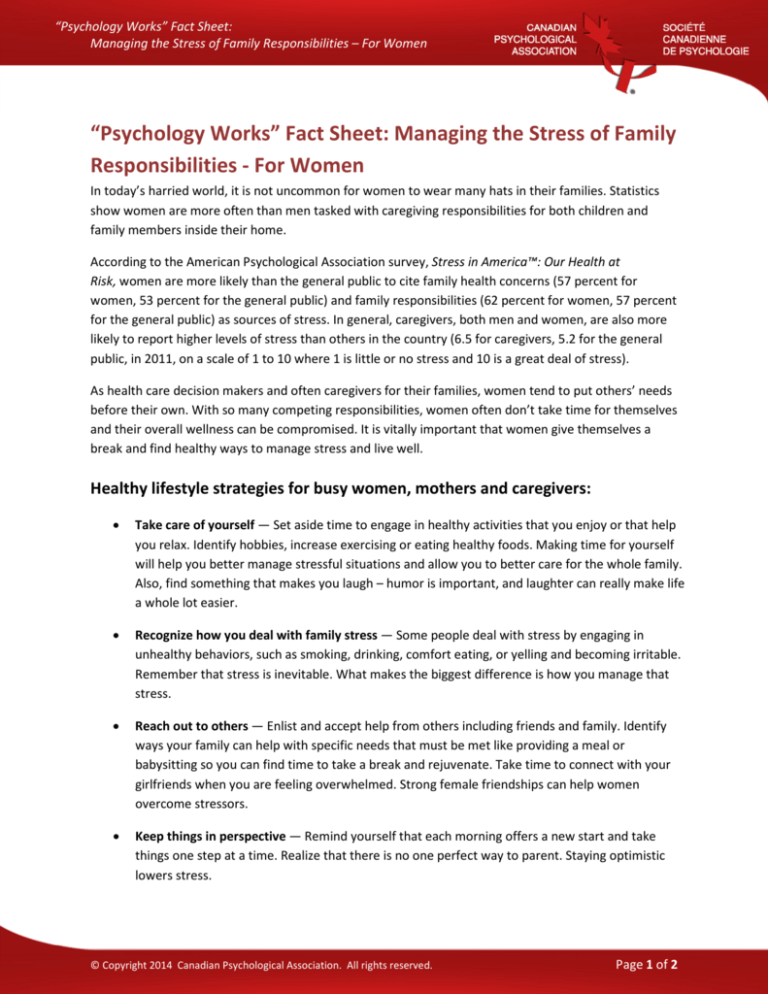
“Psychology Works” Fact Sheet:
Managing the Stress of Family Responsibilities – For Women
“Psychology Works” Fact Sheet: Managing the Stress of Family
Responsibilities - For Women
In today’s harried world, it is not uncommon for women to wear many hats in their families. Statistics
show women are more often than men tasked with caregiving responsibilities for both children and
family members inside their home.
According to the American Psychological Association survey, Stress in America™: Our Health at
Risk, women are more likely than the general public to cite family health concerns (57 percent for
women, 53 percent for the general public) and family responsibilities (62 percent for women, 57 percent
for the general public) as sources of stress. In general, caregivers, both men and women, are also more
likely to report higher levels of stress than others in the country (6.5 for caregivers, 5.2 for the general
public, in 2011, on a scale of 1 to 10 where 1 is little or no stress and 10 is a great deal of stress).
As health care decision makers and often caregivers for their families, women tend to put others’ needs
before their own. With so many competing responsibilities, women often don’t take time for themselves
and their overall wellness can be compromised. It is vitally important that women give themselves a
break and find healthy ways to manage stress and live well.
Healthy lifestyle strategies for busy women, mothers and caregivers:
•
Take care of yourself — Set aside time to engage in healthy activities that you enjoy or that help
you relax. Identify hobbies, increase exercising or eating healthy foods. Making time for yourself
will help you better manage stressful situations and allow you to better care for the whole family.
Also, find something that makes you laugh – humor is important, and laughter can really make life
a whole lot easier.
•
Recognize how you deal with family stress — Some people deal with stress by engaging in
unhealthy behaviors, such as smoking, drinking, comfort eating, or yelling and becoming irritable.
Remember that stress is inevitable. What makes the biggest difference is how you manage that
stress.
•
Reach out to others — Enlist and accept help from others including friends and family. Identify
ways your family can help with specific needs that must be met like providing a meal or
babysitting so you can find time to take a break and rejuvenate. Take time to connect with your
girlfriends when you are feeling overwhelmed. Strong female friendships can help women
overcome stressors.
•
Keep things in perspective — Remind yourself that each morning offers a new start and take
things one step at a time. Realize that there is no one perfect way to parent. Staying optimistic
lowers stress.
© Copyright 2014 Canadian Psychological Association. All rights reserved.
Page 1 of 2
“Psychology Works” Fact Sheet:
Managing the Stress of Family Responsibilities – For Women
•
Prioritize — You can only do one thing at a time. Delay or say no to the unimportant tasks, and
make appointments for more important tasks, such as spending quality time with a spouse or
child.
•
Be organized — Keeping the family and yourself organized reduces stress. Put family health
information in separate folders; get family members to keep laundry in color coded baskets; keep
book bags in assigned bins. Harried searching for things adds to mom’s stress. Enlist your
children’s help in developing an organization plan for your household - if they are involved in the
planning, they will be more likely to follow through.
•
Ask for professional help — If you feel overwhelmed by stress or the unhealthy behaviors you
use to cope, you may want to talk with a psychologist who can help you address the emotions
behind your worries, better manage stress and change unhealthy behaviors.
Where can I get more information?
Provincial associations of psychology: http://www.cpa.ca/public/whatisapsychologist/PTassociations
Psychology Foundation of Canada: http://www.psychologyfoundation.org
American Psychological Association (APA): http://www.apa.org/helpcenter
Details of APA’s Stress in America™ survey can be found at: http://www.stressinamerica.org
You can consult with a registered psychologist to find out if psychological interventions might be of help
to you. Provincial, territorial, and some municipal associations of psychology often maintain referral
services. For the names and coordinates of provincial and territorial associations of psychology, please
visit: http://www.cpa.ca/public/whatisapsychologist/PTassociations .
This fact sheet has been prepared for the Canadian Psychological Association by the Ontario Psychological
Association and the American Psychological Association.
Revised: May 2012
Your opinion matters! Please contact us with any questions or comments about any of the Psychology
Works Fact Sheets: factsheets@cpa.ca
Canadian Psychological Association
141 Laurier Avenue West, Suite 702
Ottawa, Ontario K1P 5J3
Tel: 613-237-2144
Toll free (in Canada): 1-888-472-0657
© Copyright 2014 Canadian Psychological Association. All rights reserved.
Page 2 of 2





